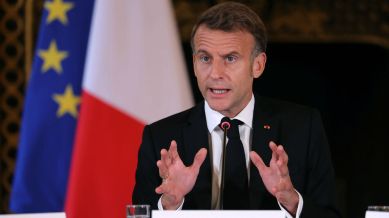Macron faces D-Day as deadline to name new French prime minister nears
Macron has given himself until Friday evening to name the next prime minister.

President Emmanuel Macron is set to meet leaders of France’s main political parties on Friday before deciding on a new prime minister, as the country’s central bank warned that political uncertainty is hurting economic growth, Reuters reported.
Macron, 47, is seeking his sixth prime minister in less than two years. He must choose someone who can bridge the gap between the centre-right and centre-left to secure approval for the 2026 budget in a divided parliament.
The Elysee Palace said the meeting was meant to be a “moment of collective responsibility”. Analysts told Reuters this could signal that Macron might call snap elections if party leaders fail to agree on a suitable candidate.
Macron’s deadline to name premier
Macron has given himself until Friday evening to name the next prime minister.
The French newspaper Le Parisien reported that Macron is leaning towards reappointing Sebastien Lecornu, who resigned on Monday after only 27 days in office. The report said the president may consider a snap election if other party leaders reject the move.
The Elysee did not comment on the report. Other names discussed include Jean-Louis Borloo, a veteran centrist; Pierre Moscovici, head of the public auditor; and Nicolas Revel, who oversees the Paris hospitals authority.
“Good luck to him,” says Green party chief
Reappointing Lecornu could further strain Macron’s relations with other political groups.
Green Party leader Marine Tondelier told TF1 television: “People tell me he’s going to test the Lecornu 2 idea on us. If that’s the case, I wish him good luck.”
Former prime minister Gabriel Attal, who now leads Macron’s Renaissance party, also warned against choosing a premier without first reaching an agreement among parties. “I fear that trying the same method… of naming a prime minister before there has been a compromise will produce the same effects,” he told France 2 television, according to Reuters.
The meeting, scheduled for 1230 GMT, excludes both the far-right National Rally (RN) and the hard-left France Unbowed (LFI), two of the largest parties in parliament.
“The RN is honoured not to have been invited. We are not for sale to those around Macron,” RN chairman Jordan Bardella wrote on X.
Risk of snap election
Most mainstream parties want to avoid an early parliamentary vote. Opinion polls suggest the RN would benefit the most, with the likely outcome being another hung parliament split among three rival blocs.
The crisis follows Macron’s failed gamble on a snap election last year, which left him with a weaker position in parliament.
France’s central bank chief Francois Villeroy de Galhau told RTL radio that the political uncertainty could cut 0.2 percentage points from GDP growth. “Uncertainty is the number one enemy of growth,” he said.
He added that the deficit should not exceed 4.8 per cent of GDP in 2026, while this year’s deficit is expected to reach 5.4 per cent, nearly double the European Union’s limit.
The turmoil has also drawn attention from credit rating agencies, which issued new warnings about France’s sovereign credit rating this week after Lecornu’s short-lived government resigned on Monday, just hours after naming its cabinet.